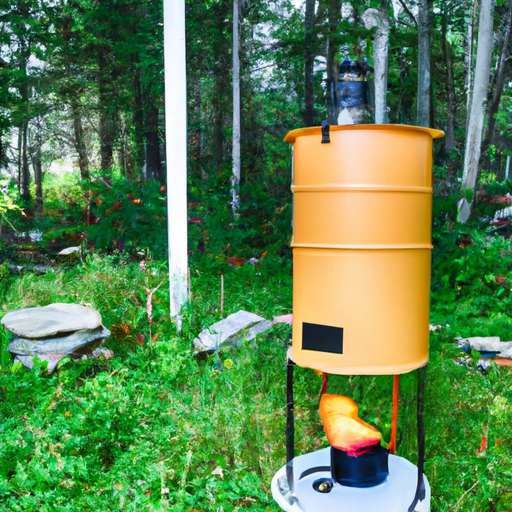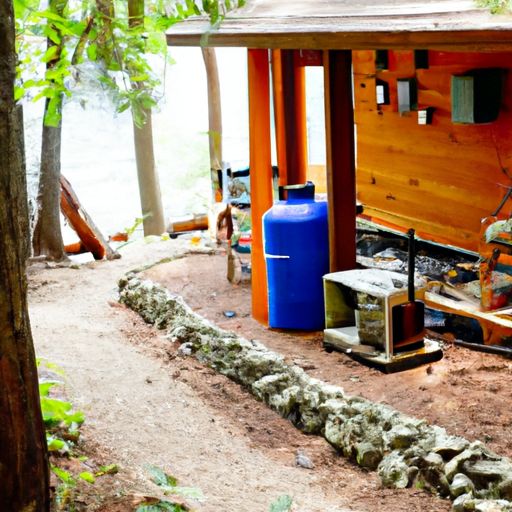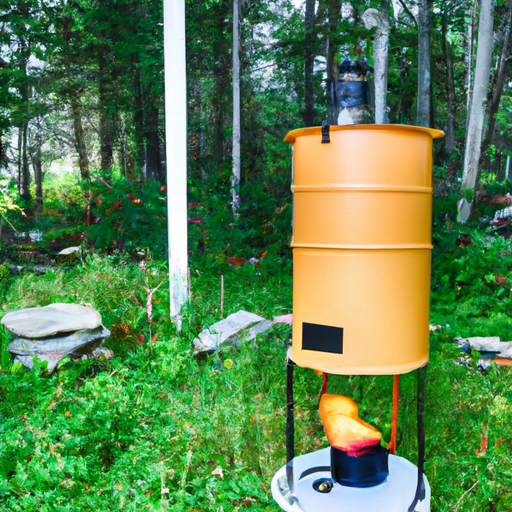Have you ever wondered what it would be like to live off the grid in a different country? Maybe you’ve fantasized about disconnecting from the hustle and bustle of modern life, living self-sustainably, and being completely independent. Well, you’re not alone. Off-grid living has become a popular lifestyle choice for many individuals seeking simplicity and sustainability. But before you pack your bags and head off to live in a remote cabin in the woods, there are a few things you need to know about off-grid living in different countries.
From the mountains of Switzerland to the deserts of Australia, off-grid living is possible in many countries around the world. However, it’s important to note that each country has its own regulations and requirements when it comes to living off the grid. Some countries, like Canada and New Zealand, have embraced off-grid living and have specific guidelines in place to ensure sustainable practices. On the other hand, some countries have stricter regulations and may require permits or inspections for off-grid homes. In our upcoming article, we will dive deeper into the specific countries that allow off-grid living and explore the different experiences and challenges you may encounter.
So, whether you’re dreaming of living off the grid in Norway or contemplating a life without electricity in the jungles of Costa Rica, our article will provide you with the information you need to make an informed decision. We’ll cover everything from the legalities and regulations to the logistics of setting up your off-grid home. So stay tuned and get ready to learn more about off-grid living in different countries. Trust me, you won’t want to miss it!

What You Need to Know About Off-Grid Living in Different Countries
Off-grid living, also known as self-sufficiency, is a lifestyle that has gained popularity in recent years. By disconnecting from traditional utilities such as electricity, water, and gas, individuals and communities can reduce their environmental impact, become more self-reliant, and embrace a simpler way of life. However, this lifestyle also comes with its own set of challenges. In this article, we will explore the benefits and challenges of off-grid living, as well as the specific practices and opportunities available in different countries around the world.
Benefits of Off-Grid Living
Lower environmental impact
One of the major advantages of living off the grid is the reduced environmental impact. By generating your own power through renewable energy sources such as solar panels or wind turbines, you can significantly decrease your carbon footprint. Additionally, off-grid living often involves practicing sustainable habits like water conservation, composting, and growing your own food, further reducing your impact on the planet.
Reduced dependency on utilities
Living off the grid means freeing yourself from the constraints of utility companies. Instead of relying on potentially unreliable or expensive energy providers, you have full control over your power, water, and heating systems. This independence can bring peace of mind and eliminate the stress of fluctuating energy prices or power outages.
Increased self-sufficiency
Off-grid living encourages self-reliance and self-sufficiency. By growing your own food, collecting and managing your own water sources, and generating your own power, you become less dependent on outside resources. This sense of independence not only provides a feeling of accomplishment but also fosters resilience in the face of unforeseen circumstances or emergencies.
Challenges of Off-Grid Living
Limited access to utilities
While off-grid living offers independence from traditional utilities, it also means you may have limited access to essential services. Depending on the location and resources available, obtaining reliable water sources, internet connection, or emergency medical services may be challenging. Therefore, careful research and planning are essential to ensure that you have access to the necessary utilities and services before embarking on an off-grid lifestyle.
Higher upfront costs
Transitioning to off-grid living often requires a significant upfront investment. Purchasing solar panels, wind turbines, batteries, and other necessary infrastructure can be quite expensive. Additionally, off-grid homes often require specialized designs and construction methods to maximize energy efficiency. However, it’s important to note that while the initial costs may be high, over time, the savings on energy bills can offset these expenses.
Greater responsibility for maintenance
Living off the grid also means taking on a greater responsibility for the maintenance of your systems and infrastructure. Unlike relying on utility companies to resolve issues, you will need to troubleshoot and fix any problems that arise with your power, water, or heating systems. This requires a certain level of technical knowledge or the willingness to learn and adapt to new maintenance tasks.
Now let’s explore how off-grid living is practiced in different countries around the world.
United States
Off-grid communities in California
California is home to numerous off-grid communities, particularly in areas like Joshua Tree and the Sierra Nevada mountains. These communities are driven by a desire for environmental sustainability and self-sufficiency. Some residents rely on solar power, rainwater collection systems, and composting toilets to minimize their impact on the environment.
Regulatory restrictions in some states
While off-grid living is gaining traction in the United States, it’s essential to be aware of regulatory restrictions in certain states. Some states have laws prohibiting or limiting the use of rainwater collection systems or the installation of certain off-grid technologies. Therefore, it’s crucial to familiarize yourself with local regulations before pursuing an off-grid lifestyle in these areas.
Incentives for off-grid living
Despite the regulatory challenges, the United States also offers incentives for off-grid living. Some states provide tax credits or grants for individuals or communities interested in transitioning to renewable energy sources. Additionally, federal initiatives promote the use of sustainable technologies and provide financial support for off-grid living projects.
Canada
Remote off-grid living in British Columbia
British Columbia is known for its stunning wilderness and vast remote areas, making it an ideal location for off-grid living. Many individuals and communities in this province rely on alternative energy sources such as solar power, wind turbines, or small-scale hydro systems. While access to utilities can be challenging in these remote locations, the government provides support and subsidies for renewable energy projects.
Northern communities embracing off-grid lifestyle
In Canada’s northern regions, remote communities have been living off-grid for generations. These communities often rely on traditional practices, such as hunting, fishing, and trapping, to sustain themselves. With the support of the government, these communities are now integrating modern off-grid technologies, such as solar panels and wind turbines, to improve their quality of life without compromising their connection to the land.
Support from government initiatives
The Canadian government recognizes the value of off-grid living and has implemented various initiatives to support this lifestyle. Through financial incentives and programs, such as tax credits for renewable energy investments or subsidies for green building projects, the government encourages individuals and communities to reduce their reliance on traditional utilities and embrace self-sufficiency.

Australia
Off-grid living in the Outback
Australia’s vast, arid Outback poses unique challenges and opportunities for off-grid living. With its abundant sunlight, solar power is the primary energy source for many off-grid dwellers in this region. Additionally, rainwater collection and treatment systems are commonly used to ensure a reliable water supply. Sustainable housing projects, like Earthships, have also gained popularity, offering energy-efficient and environmentally friendly living spaces.
Solar power subsidies
The Australian government provides generous incentives for transitioning to solar power, making it an attractive option for off-grid living. Through schemes such as Small-scale Technology Certificates, homeowners and businesses are rewarded with financial incentives for installing solar panels. These subsidies help offset the initial costs of the infrastructure required for off-grid living.
New Zealand
Off-grid living in rural areas
New Zealand’s picturesque rural landscapes provide an idyllic backdrop for off-grid living. With its abundant renewable energy resources, many rural dwellers generate their own power through solar or wind systems. Rainwater collection, composting toilets, and organic gardening practices are also common among off-grid residents, promoting sustainable living and a connection to nature.
Alternative energy solutions
New Zealand is known for its emphasis on renewable energy. With ambitious goals, the government supports the development of innovative off-grid technologies, such as smart grids and energy storage systems. These advancements enable off-grid living to become even more efficient and accessible for individuals and communities throughout the country.
Community support for off-grid lifestyle
The close-knit communities in rural New Zealand often provide a strong support system for those embracing off-grid living. Sharing resources, knowledge, and experiences with like-minded individuals fosters a sense of community and collaboration. Conferences and workshops dedicated to sustainable living are common, offering opportunities for education and networking within the off-grid community.
Sweden
Off-grid housing in remote locations
Sweden’s remote locations, including its vast forests and archipelagos, offer a perfect setting for off-grid living. Many off-grid enthusiasts in Sweden rely on renewable energy sources, such as solar panels, wind turbines, or hydropower systems, to meet their energy needs. In addition to generating their own power, sustainable practices like composting, recycling, and organic farming are embraced to minimize environmental impact.
Focus on renewable energy sources
Sweden’s commitment to renewable energy is evident in its ambitious goals and policies. The government actively supports the transition to sustainable living through financial incentives, grants, and subsidies for renewable energy projects. These initiatives promote off-grid living and encourage individuals and communities to adopt renewable energy sources as a primary means of powering their homes.
Government support for sustainable living
In addition to financial incentives, the Swedish government also provides support through research and development initiatives. Collaborations between universities, research institutions, and private companies contribute to innovations in energy technology, energy storage systems, and sustainable building practices. This support enables off-grid enthusiasts in Sweden to stay at the forefront of sustainable living.
Norway
Off-grid living in fjord regions
Norway’s breathtaking fjord regions offer a unique backdrop for off-grid living. Many residents in these areas have been living off-grid for generations, relying on hydropower as their primary energy source. The abundance of rivers and waterfalls allows for the generation of clean and renewable energy, providing a self-sufficient and sustainable way of life.
Hydropower as a primary energy source
Norway’s commitment to hydropower is deeply ingrained in its culture and infrastructure. The government has invested heavily in hydroelectric power plants, making it the country’s primary source of electricity. This emphasis on renewable energy supports off-grid communities in remote regions, allowing them to harness the power of their surrounding natural resources.
Small off-grid communities
Norway’s rugged terrain and remote locations have given rise to small off-grid communities throughout the country. These communities often share resources and knowledge, allowing for a stronger sense of self-sufficiency and community support. While off-grid living in Norway can be challenging due to harsh climates and limited access to services, the tight-knit nature of these communities helps overcome these obstacles.
Brazil
Off-grid living in the Amazon rainforest
The Amazon rainforest in Brazil is home to off-grid communities that live in harmony with nature. These communities often rely on a combination of solar and wind power, as well as small-scale hydropower systems, to meet their energy needs. Despite the challenges of logistics and infrastructure in the remote rainforest, the residents embrace their self-sufficient lifestyle and the natural abundance that surrounds them.
Solar and wind power integration
Solar and wind power integration is a common practice in off-grid communities throughout Brazil. The ample sunlight and wind resources in many regions make these renewable energy sources viable options. By combining different energy generation methods, residents can ensure a steady supply of power even in periods of low sunlight or wind speed.
Challenges of infrastructure and logistics
Living off the grid in the Amazon rainforest comes with unique challenges. The remote location and lack of infrastructure require off-grid residents to be self-reliant in sourcing food, water, and other essential supplies. Additionally, the logistics of transporting equipment and materials for off-grid systems can be complex and costly. However, the natural beauty and richness of the rainforest make the challenges worthwhile for those embracing this lifestyle.
Conclusion
Off-grid living offers numerous benefits and challenges that vary depending on the country and specific location. Each country showcased in this article has its unique practices, incentives, and support systems for those interested in embracing a self-sufficient lifestyle. Before embarking on an off-grid journey, it’s essential to consider local regulations, access to utilities and services, and the specific conditions of the area. With careful planning and research, off-grid living can provide a fulfilling and sustainable way of life, no matter where you choose to reside.




